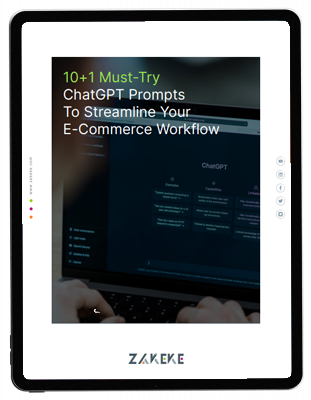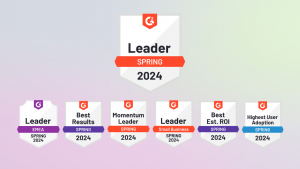Imagine your online store running on autopilot, with personalized messages reaching customers at just the right moment, abandoned cart reminders, product recommendations, and targeted ads finding the perfect audience.
Sounds like a dream, right?
Well, that’s the power of e-commerce marketing automation. It’s not magic, but it’s pretty darn close.
By automating repetitive tasks and leveraging data-driven insights, you can free up your time, boost your sales, and create a seamless shopping experience for your customers.
And the numbers speak for themselves:
- 80% of marketing automation users saw their number of leads increase using automation, and 77% saw the number of conversions increase;
- Automated emails generate 320% more revenue than non-automated emails.
Let’s look at how you too can ditch the manual grind and unlock the full potential of your business using eCommerce marketing automation strategies and tools.
What Is Marketing Automation For eCommerce?
E-commerce marketing automation is the process of using tools & AI to perform various marketing tasks automatically in an online retail environment.
These tools help improve efficiency by automating repetitive processes, enabling businesses to offer personalized content, target specific customer segments, and optimize their overall marketing strategy.
Automation software empowers e-commerce businesses to engage with their audience in a more timely and relevant manner by sending targeted emails and managing social media campaigns. Ultimately, this improves the e-commerce customer experience and drives sales.
For example, if a customer leaves items in their cart without checking out, an abandoned cart email can be sent automatically to remind them of their purchase and encourage them to complete it.
Benefits of eCommerce Marketing Automation
Automating your eCommerce marketing tasks can be a game-changer, freeing up your time, boosting your sales, and creating a more personalized experience for your customers. Here are 4 key benefits of automating your eCommerce marketing:
1. Saves You Time and Money
Repetitive tasks like sending abandoned cart emails, managing social media posts, and creating personalized product recommendations can take up a huge chunk of your time.
Ecommerce marketing automation tools handle these tasks for you, freeing you up to focus on strategic initiatives like product development, market research, and building customer relationships.
This can lead to significant cost savings in the long run, as you won’t need to hire additional staff to handle these tasks on a bigger scale.
2. Boosts Sales and Conversions
Automated marketing campaigns can be highly targeted and personalized, leading to a significant increase in sales and conversions.
By sending abandoned cart emails, triggering product recommendations based on browsing history, and offering personalized discounts, you can nudge customers toward making a purchase.
Additionally, automated email sequences can nurture leads and turn them into loyal customers.
3. Enhances Customer Experience
Automation tools can help you personalize your marketing efforts by segmenting your audience based on demographics, purchase history, and interests.
This allows you to send targeted messages and recommendations that are relevant to each customer. As a result, customers are more likely to engage with your brand and make repeat purchases.
4. Data-Driven Decision Making
Automation tools track and analyze data from your marketing campaigns, giving you valuable insights into what’s working and what’s not. This data can be used to optimize your campaigns, improve targeting, and personalize your messaging even further.
With the right data, you can make informed decisions about your marketing strategy and ensure that you’re getting the most out of your investment.
9 Effective eCommerce Marketing Automation Strategies
1. Create Dynamic Content for Personalized Experiences
80% of consumers are more likely to do business with a company offering personalized experiences. Dynamic content involves tailoring website elements and marketing materials based on individual user behavior.
By analyzing data on customer preferences, past purchases, and online behavior, businesses can dynamically display personalized product recommendations, promotions, and even website layouts.
Amazon excels in this by dynamically adjusting its homepage to showcase products relevant to each user’s browsing and purchase history.
This approach improves user engagement, increases the likelihood of conversions, and provides a more personalized and enjoyable shopping experience to customers, ultimately leading to higher customer satisfaction and loyalty.
2. Send Welcome Emails
Welcome emails play a vital role in establishing a positive relationship with new customers and many brands do this for better engagement.
By automating welcome emails, eCommerce businesses can create a warm introduction, encourage users to explore their offerings, and potentially lead to the first purchase.
Airbnb, for example, sends personalized welcome emails to new users, providing essential information about their platform and services.
This initial positive interaction also sets the tone for a long-lasting and positive customer relationship.
3. Send Cart Abandonment Emails
Shopping cart abandonment is a common phenomenon in e-commerce, with an average abandonment rate hovering around 70% which leads to a loss of $18 billion in sales revenue annually.
Cart abandonment email automation can be your powerful weapon to recover lost sales. It involves automatically sending targeted emails to users who have added items to their shopping carts but left the website without completing the purchase.
This strategy aims to re-engage potential customers, remind them of their abandoned carts, and convert those forgotten carts into purchases. Remember, cart abandonment email automation is a powerful tool, but personalization is key.
The best approach is to send a series of emails, starting with a gentle reminder and escalating with increasing incentives over time. Tailor your approach to your brand and audience for maximum impact.
4. Send Automatic SMS Messages
Automatic SMS messages offer a direct and immediate way to engage with customers.
By incorporating automatic SMS messages into marketing campaigns, eCommerce businesses can reach customers directly on their mobile devices, delivering timely promotions, personalized offers, and important updates.
This strategy not only improves customer satisfaction but also contributes to increased sales through immediate and impactful communication.
For example, after a customer makes a purchase, Sephora sends automated SMS notifications confirming the order and providing a link for shipment tracking.
This real-time tracking information keeps customers informed about their deliveries, enhancing transparency and reducing uncertainty.
5. Use Automated Chatbots
Automated chatbots are invaluable tools for eCommerce businesses, providing immediate assistance and enhancing customer engagement.
A noteworthy illustration is Spencer’s, a retail brand that harnesses automated chatbots to aid customers in navigating their online platform and addressing product-related inquiries.
Spencer’s chatbots emulate real-time conversations, delivering personalized product recommendations, addressing concerns, and streamlining the checkout process.
By automating routine customer interactions, Spencer’s ensures a seamless and efficient user experience, contributing to customer satisfaction and increased conversion rates.
6. Utilize Ad Retargeting
Ad retargeting is a strategic approach employed by eCommerce businesses to re-engage visitors who have previously interacted with their website but did not complete a purchase.
This approach effectively leverages the power of personalized e-commerce advertising to nurture leads and drive them back into the sales funnel, ultimately contributing to increased conversions and customer retention.
Nike aces ad retargeting. They feature personalized ads of the exact products they viewed or similar items when browsing other websites or social media platforms.
These personalized ads serve as a reminder, enticing the potential customer to return and finalize their purchase.
Nike’s ad retargeting strategy also often includes exclusive discounts or promotions to further incentivize conversion.
7. Automate Upselling & Cross-Selling
Automating upselling and cross-selling is a strategic approach where eCommerce platforms recommend additional or complementary products to customers during the purchasing process.
This technique significantly enhances the overall shopping experience and contributes to increased revenue. However, automating this process can be a lot more effective, and time-saving.
Once again Amazon, one of the eCommerce leaders is a prime example of automating upselling and cross-selling. They employ sophisticated algorithms to suggest related products based on a customer’s browsing and purchase history.
This automated approach maximizes the value of each transaction, increases the average order value, and enhances the overall shopping experience by providing customers with relevant and complementary options.
8. Use Segmentation & Lead Scoring
Segmentation and lead scoring involve categorizing customers based on their behavior, preferences, and engagement level.
All leads are not the same and lead scoring helps prioritize leads by assigning scores and understanding where they stand in the sales funnel based on their interactions with the brand.
Lead scoring can make your sales outreach more effective and boost conversions by helping you personalize and automate content for outreach depending on their position in the sales funnel.
For example, if you have leads who seem less engaged or have low scores, you can further categorize them and send them personalized content to gradually build their interest.
Once they show signs of being ready to purchase from your eCommerce store, you can automatically include them in a drip campaign to gently guide them toward completing the purchase.
9. Set up Special Discount & Offers to Loyal Customers
Rewarding loyal customers with special discounts and offers is a proven strategy to foster brand loyalty and repeat business. We can learn from Starbucks’ loyalty program.
Starbucks’ automated system tracks customer purchases, and based on their buying behavior, it automatically sends personalized offers and discounts directly to customers via the Starbucks mobile app.
These targeted incentives not only express appreciation to loyal customers but also drive them to make additional purchases, strengthening their connection with the brand and contributing to increased customer retention and lifetime value.
Best eCommerce Marketing Automation Tools
1. eCommerce Automation Tools
These comprehensive platforms streamline overall eCommerce operations, integrating various functions like inventory management, recommendations, order processing, and customer relationship management for a seamless end-to-end process.
- Zakeke: Enhances customer shopping experience by offering revolutionizing features for product showcase and customization, primarily through 3D & AR technology, streamlining order management with production-ready files;
- Klaviyo: Powerful platform with advanced data analysis, segmentation capabilities, and personalized email and SMS automation.
- Omnisend: All-in-one solution for email, SMS, and pop-up campaigns, with built-in abandoned cart recovery and pre-built workflows for various customer journeys.
2. Email Marketing Automation Tools
Email marketing automation tools for e-commerce automate and track email campaign results, optimizing personalized communication for targeted newsletters, promotions, and responses that enhance customer engagement and retention.
- Mailchimp: Offers email templates, email automation workflows, and landing page creation tools.
- ActiveCampaign: Scalable platform with automation sequences, CRM integration, and advanced analytics for optimizing campaigns.
- HubSpot: Comprehensive marketing suite including email automation, landing pages, CRM, and social media management.
3. SMS Marketing Automation Tools
These tools automate SMS delivery for text messaging campaigns, allowing businesses to directly reach customers’ mobile devices with personalized promotions, updates, and transactional messages.
- SimpleTexting: User-friendly platform for sending bulk SMS, scheduling messages, and managing opt-ins/outs.
- Podium: Integrates with POS systems for automated appointment reminders, order updates, and customer feedback collection.
- Twilio: Powerful API-based solution for building custom SMS applications and integrating with your existing systems.
4. Social Media Automation Tools
Social media automation tools automate scheduling and posting across social media platforms, track engagement, and analyze performance, ensuring consistent and strategic social media presence.
- Hootsuite: Manage multiple social media accounts, schedule posts, track engagement, and analyze campaign performance.
- Buffer: Schedule social media posts, analyze content performance, and collaborate with team members on content creation.
- Sprout Social: All-in-one platform for social media management, including listening, publishing, analytics, and customer engagement.
5. Sales Automation Tools
Sales automation tools automate various sales tasks such as lead generation, follow-ups, and pipeline management, which ultimately lead to an increase in sales team efficiency and a more personalized sales approach.
- Pipedrive: Visual pipeline management, lead scoring, and automated email sequences to nurture leads and close deals.
- Salesforce: Powerful CRM platform for managing customer interactions, tracking leads, and automating sales processes.
- Zoho CRM: Affordable CRM solution with email marketing, lead scoring, and automation capabilities for managing customer relationships.
6. Chatbots
Automated chatbots that can handle customer interactions, answer inquiries, guide users through sales, and offer personalized assistance. They improve user experience and engagement on websites and messaging apps.
- ManyChat: Build chatbots for Facebook Messenger, Instagram, and other platforms, offering customer support, product recommendations, and automated sales funnels.
- Drift: Integrate chatbots with your website to capture leads, answer FAQs, and personalize customer interactions.
- HubSpot Chat: Conversational marketing tool offering live chat, chatbots, and email integration for seamless customer engagement.
Implementing eCommerce Marketing Automation
Ecommerce marketing automation can prove to be highly beneficial for any eCommerce business, regardless of its size and nature.
By automating various processes, such as lead qualification, lead nurturing, campaign management, and workflow building, marketing teams can enhance their efficiency and achieve greater ROI.
It is essential to have a clear understanding of your business goals and objectives before selecting the right automation tools and integrating them into your workflows. With proper alignment, these tools can streamline your marketing processes and help your business grow.

Pratik Shinde
Founder – Growthbuzz
Pratik Shinde is a Founder at Growthbuzz Media, a Content Creator at Make SaaS Better, and an SEO enthusiast. He helps fast-paced B2B SaaS startups acquire customers through organic marketing efforts. He likes reading philosophy, writing non-fiction, thoughtful walking, running, and traveling.













